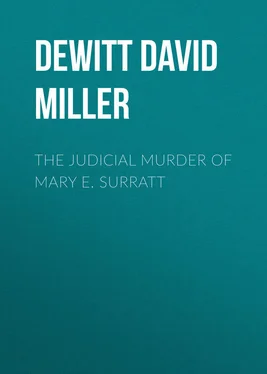David DeWitt - The Judicial Murder of Mary E. Surratt
Здесь есть возможность читать онлайн «David DeWitt - The Judicial Murder of Mary E. Surratt» — ознакомительный отрывок электронной книги совершенно бесплатно, а после прочтения отрывка купить полную версию. В некоторых случаях можно слушать аудио, скачать через торрент в формате fb2 и присутствует краткое содержание. Жанр: foreign_antique, foreign_prose, на английском языке. Описание произведения, (предисловие) а так же отзывы посетителей доступны на портале библиотеки ЛибКат.
- Название:The Judicial Murder of Mary E. Surratt
- Автор:
- Жанр:
- Год:неизвестен
- ISBN:нет данных
- Рейтинг книги:5 / 5. Голосов: 1
-
Избранное:Добавить в избранное
- Отзывы:
-
Ваша оценка:
- 100
- 1
- 2
- 3
- 4
- 5
The Judicial Murder of Mary E. Surratt: краткое содержание, описание и аннотация
Предлагаем к чтению аннотацию, описание, краткое содержание или предисловие (зависит от того, что написал сам автор книги «The Judicial Murder of Mary E. Surratt»). Если вы не нашли необходимую информацию о книге — напишите в комментариях, мы постараемся отыскать её.
The Judicial Murder of Mary E. Surratt — читать онлайн ознакомительный отрывок
Ниже представлен текст книги, разбитый по страницам. Система сохранения места последней прочитанной страницы, позволяет с удобством читать онлайн бесплатно книгу «The Judicial Murder of Mary E. Surratt», без необходимости каждый раз заново искать на чём Вы остановились. Поставьте закладку, и сможете в любой момент перейти на страницу, на которой закончили чтение.
Интервал:
Закладка:
Is she too ironed?
The unanimous testimony of eye-witnesses published at the time of the trial is, that, though not hand-cuffed, she was bound with iron “anklets” on her feet. And this detail, thus universally proclaimed in the Northern Press and by loyal writers, was mentioned not as conveying the slightest hint of reprobation, but as constituting, like the case of the male prisoners, a part of the appropriate treatment by the military of a person suffering under such a charge. And, moreover, no contemporaneous denial of this widespread circumstance was anywhere made, either by Provost-Marshal, Counsel, Judge-Advocate or member of the Court. It passed unchallenged into history, like many another deed of shame, over which it is a wonder that any man could glory, but which characterized that period of frenzy.
Eight years after, during the bitter controversy between Andrew Johnson and Joseph Holt over the recommendation of mercy to Mrs. Surratt, General Hartranft, the former Special Provost-Marshal in charge of the prisoners, first broke silence and, coming to the aid of the sorely-tried Ex-Judge-Advocate, sent him a vehement categorical denial that Mrs. Surratt was ever manacled at any time, or that there was ever a thought of manacling her in any one’s mind. Now, what force should be given to such a denial by so distinguished an officer, so long delayed and in the face of such universal contemporaneous affirmation?
No one knows how close and exclusive the charge of the prisoners by the special Provost-Marshal was, nor how liable to interruption, interference and supersession by the omnipotent Bureau of Military Justice, or by the maddened Secretary of War and his obsequious henchmen.
At the time the naked assertion was made, to heap indignities upon the head of the only woman in the whole country whom the soldiery took for granted was the one female fiend who helped to shed the blood of the martyred President, was so consonant with the angry feeling, in military circles, that an officer, having only a general superintendence over the custody and treatment of what was called “a band of fiends,” would be very likely to overlook such a small matter as that the she-assassin was not exempted, in one detail, from the contumelies and cruelties it was thought patriotic to pile upon her co-conspirators. The only wonder ought to be that they relieved her from the hand-cuffs. They appear to have discriminated in the case of Dr. Mudd also, substituting a chain for an inflexible bar so that he for one could move his hands. There may have been some unmentioned physical reasons for both of these alleviations, but we may rest assured that neither sex, in the one case, nor profession in the other, was among them.
General Hartranft (or any other General) never denied, or thought it necessary to deny, that the seven male prisoners sat through the seven weeks of the trial, loaded, nay tortured, with irons. And there is no doubt that this unspeakable outrage, if thought of at all at the trial by the soldiery – high or low – so far from being thought of as a matter of reprobation, was a subject of grim merriment or stern congratulation.
Eight years, however, passed away – eight years, in which a fund of indignation at such brutality, above all to a woman, had been silently accumulating, until at length to a soldier, whose beclouding passions of the moment had in the meantime cooled down, its weight made every loop-hole of escape an entrance for the very breath of life.
The entire atmosphere had changed, and denials became the order of the day. Memory is a most convenient faculty; and to forget what the lapse of years has at last stamped with infamy is easy, when the event passed at the time as a mere matter of course. Leaving these tardy repudiators of an iniquity, the responsibility for which in the day of its first publication they tacitly assumed with the utmost complacency, to settle the question with posterity; – we insist that the preference is open to writers upon the events of the year 1865 to rely upon the unprejudiced and unchallenged statements of eye-witnesses; and, therefore, we do here reaffirm that Mary E. Surratt walked into the court-room, and sat during her trial, with shackles upon her limbs.
At this late day it is a most natural supposition that these nine stalwart military heroes, sitting comfortably around their table, arrayed in their bright uniforms, with their own arms and their own legs unfettered, must have felt at least a faint flush of mingled pity, shame and indignation, as they looked across that room at that ironed row of human beings.
Culprits arraigned before them, guarded by armed soldiery, without arms themselves – why, in the name of justice, drag them into Court and force them to sit through a long trial, bound with iron, hand and foot? Was it to forestall a last possible effort of reckless and suicidal despair?
These brave warriors could not have feared the naked arm of Payne, nor have indulged the childish apprehension that seven unarmed men and one unarmed woman might overpower six armed soldiers and nine gallant officers, and effect their escape from the third story of a prison guarded on all sides with bayonets and watched by detective police! And yet, so far as appears, no single member of the Court, to whom such a desecration of our common humanity was a daily sight for weeks, thought it deserving of notice, much less of protest.
There is but one explanation of this moral insensibility, and that applies with the same force to the case of the woman as to those of the men. It is, that the accused were already doomed . For them no humiliation could be thought too deep, no indignity too vile, no hardship too severe, because their guilt was predetermined to be clear. And the members of the Military Commission, as they looked across the room at that sorry sight, saw nothing incongruous with justice, or even with the most chivalrous decorum, that the traitorous murderers of their beloved Commander-in-Chief should wear the shackles which were the proper precursors of the death of ignominy, they were resolved the outlaws should not escape.
We, civilians, must ever humbly bear in mind that the rule of the common law, that every person accused of crime is presumed to be innocent until his guilt is established beyond a reasonable doubt – a rule the benignity of which is often sneered at by soldiers as giving occasion for lawyers’ tricks and quibbles, and as an impediment to swift justice, is reversed in military courts, where every person accused of crime is presumed to be guilty until he himself prove his innocence.
After the prisoners had been seated, and the members of the Commission, the Judge-Advocates and the official reporters sworn in, the accused were severally arraigned. There was but one Charge against the whole eight. Carefully formulated by the three Judge-Advocates upon the lines of the theory adopted by the Secretary of War, and which Gen. Baker and the Bureau of Military Justice had been moving heaven and earth to establish, it was so contrived as to allege a crime of such unprecedented, far-reaching and profound heinousness as to be an adequate cause of such an unprecedented and profound calamity.
The eight prisoners were jointly and severally charged with nothing less than having, in aid of the Rebellion, “ traitorously ” conspired, “together with one John H. Surratt, John Wilkes Booth, Jefferson Davis, George N. Sanders, Beverley Tucker, Jacob Thompson, William C. Cleary, Clement C. Clay, George Harper, George Young and others unknown, to kill and murder” “Abraham Lincoln, late President of the United States and Commander-in-Chief of the Army and Navy thereof, Andrew Johnson, then Vice-President, Wm. H. Seward, Secretary of State, and Ulysses S. Grant, Lieutenant-General;” and of having, in pursuance of such “traitorous conspiracy,” “together with John Wilkes Booth and John H. Surratt” “traitorously” murdered Abraham Lincoln, “traitorously” assaulted with intent to kill, William H. Seward, and lain in wait “traitorously” to murder Andrew Johnson and Ulysses S. Grant.
Читать дальшеИнтервал:
Закладка:
Похожие книги на «The Judicial Murder of Mary E. Surratt»
Представляем Вашему вниманию похожие книги на «The Judicial Murder of Mary E. Surratt» списком для выбора. Мы отобрали схожую по названию и смыслу литературу в надежде предоставить читателям больше вариантов отыскать новые, интересные, ещё непрочитанные произведения.
Обсуждение, отзывы о книге «The Judicial Murder of Mary E. Surratt» и просто собственные мнения читателей. Оставьте ваши комментарии, напишите, что Вы думаете о произведении, его смысле или главных героях. Укажите что конкретно понравилось, а что нет, и почему Вы так считаете.












